Marks Family Writing Center
Alumni of the center
Amelia Ahlgren
Political Science, C'11

What inspired me to become a writing tutor:
I liked the style of the writing seminars at Penn. They allowed me to explore a subject of my choice, but also allowed my creativity to thrive. After that experience, I wanted to get involved in the writing program.
How my experiences affected my Penn experience:
I think about how to structure an argument both inside and outside of the classroom. When my audience is my own friends or family, I think more about what I'm going to say before I speak. It has helped me make sure I mean exactly what I say and really improved my communication skills overall.
The most rewarding experience I've had as a writing tutor:
The most rewarding aspect of tutoring is when a student gets into the session and it becomes more of a discussion. I often will play devil's advocate to show where an argument is weak, and it is fun to get into a conversation about what other arguments the writer had considered, what s/he was trying to say. It's most enjoyable when you challenge a point and, with that, help the writer re-envision the paper.
The most important thing students take away from a session with me:
When you come up with a proposition, and you're crafting the main points of your argument, write down the words you'd use if you were making the argument to a friend. You lose meaning when you try to make your writing fancy. Start with the basics and work on the exact wording later.
About taking my own advice:
I am definitely more open to criticism of my writing and less guarded about showing it to people. Being a tutor, however, does not make me a perfect writer. I will sometimes ask my housemates to look over my papers. It's funny because they'll critique an aspect of my paper and I'll find myself thinking, "I've said the exact same thing to a tutee!"
Rebecca Salowe
Bioengineering, EAS'13

What inspired me to become a writing tutor:
I have always loved both science and writing, but saw them as separate interests that were not intertwined. On my first day of a Bioengineering class my freshmen year, my professor made a very surprising comment. Communication, he said, and being able to communicate what you know and what you have designed, is the most important tool for an engineer. Not problem-solving, not creativity, not math -- communication. Since then, I have noticed more and more ways that writing translates not only to engineering, but other fields and parts of life as well. Helping students realize that the importance of writing extends far beyond the walls of an English classroom has motivated me to become a writing tutor.
How my experiences affected my Penn experience:
Learning about a topic or field I may never have heard of before -- I have read nursing papers, medical school applications, senior theses, literature analysis, and scientific papers, to name a few examples; and meeting new people. I often find out later that a student I've worked with lives in my dorm, or that student knows some of my friends. I have often made a new friend from an appointment, and typically we forget that we met through an appointment in the first place.
The most rewarding experience I've had as a writing tutor:
Trying to ignite a student's interest in what he or she is writing is one of the toughest parts of tutoring. This past fall, I was helping a student brainstorm ideas for a "Two Reasons" exercise. I could tell he was not at all excited at all about the prospect of this work. Somehow, the topic of boxing came up, and he started talking enthusiastically about his favorite boxer (his paper was supposed to be about the style of writing...we were getting a bit off track). The student then off-handedly suggested comparing the style of writing to the style of boxing in his paper, but seemed to think it would not be an allowable topic. Since he was so excited about it, I encouraged him, and we spent the rest of the appointment outlining his paper. However, I was a little nervous that his teacher would think the topic was too far-fetched. The next week, the student returned and said his teacher absolutely loved the paper. He was so proud. I think this might have been the first time he ever felt like that about something that he wrote.
The most important thing students take away from a session with me:
Anyone can be a good writer. There is no magical gift that makes some students superior writers to others. If you work hard enough, and keep trying, your writing will improve. Everyone has this ability and it is just a matter of seeing and believing in it.
About taking my own advice:
I learn so much from reading other students' papers and noticing what is strong and reasonable, and what isn't. Whenever I read my own papers, I ask the same questions and try to use the same objectivity.
Spencer Glantz
Chemical and Biochemical Engineering, EAS'11
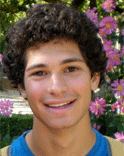
What inspired me to become a writing tutor:
In high school, I had the opportunity to mentor middle school students and teach them music theory. I derived great satisfaction from this experience. After taking advantage of the Writing Center freshman year, it occurred to me that I could bring my writing and mentoring skills to this organization and therefore was inspired to become a writing tutor.
How my experiences affected my Penn experience:
To prepare for a career as a physician, I have invested much of my Penn experience into premedical coursework and activities designed to expose me to the world of medicine. But long before I began volunteering in hospitals and shadowing surgeons, it was my experience at the Writing Center that convinced me that being a doctor was the correct career path for me. Having the opportunity to work with and gain the trust of my peers, or "patients," and "diagnose" the weaknesses in their writing while maintaining a positive atmosphere has given me a deep appreciation for helping others and prepared me more than any other experience for medical school.
The most rewarding experience I've had as a writing tutor:
Many students come to the writing center expecting me to edit their paper. Instead, based on my training, I engage in a highly interactive session where the pen is always in the student's hand. Hearing a peer say "I think I know how I want to fix this," means that I have taught a skill rather than simply given an answer.
The most important thing students take away from a session with me:
No matter how aesthetically pleasing a house may be, it will not stand without the proper foundation. In the same light, I try to emphasize in my writing sessions that colorful adjectives and poetic phrasing is secondary to a crisp organizational structure and clear transitions.
About taking my own advice:
After being exposed to the teachings of the Writing Center, I have realized that writing one draft of a paper is nothing about which to boast. I pride myself on writing multiple drafts and carefully refining my prose.
Ali Huberlie
Political Science and Urban Studies, C'11

What inspired me to become a writing tutor:
One of the greatest things my mother ever did for me was teach me to write. She used to be a professor of Journalism at Syracuse University, and corrected all of my papers when I was growing up. As a result, I entered high school confident in my writing abilities. But my freshman year English teacher, Mrs. Thistle, had even more to teach me. Combined, my mother and Mrs. Thistle made me realize that writing is one of the most important skills that a person can have. And, to their credit, I excelled in my Penn writing seminar. But I realize that not everyone has had such positive writing influences, and I wanted to help others by passing along what I've learned.
How my experiences affected my Penn experience:
As prepared as I felt for my Writing Seminar at Penn, I'm definitely still learning. I've come a long way, and my work in the Writing Center has been a huge part of that. I learn from each and every one of the students who visits the Center. I was once told that the best way to become better at anything is to "put yourself on the other side." Helping others teaches me what I need to do to improve my own writing. Additionally, I secured my job as a Writing TA through the Writing Center, and this has been an incredible experience. Combined, tutoring and TA-ing have instilled in me a love for teaching that I never realized I had.
The most rewarding experience I've had as a writing tutor:
I love receiving feedback from the students I work with because it helps me to improve my teaching and tutoring skills.
The most important thing students take away from a session with me:
I really try to emphasize the importance of the forms of reasoning taught in the Writing Seminars. They aren't just randomly made up. I think they very accurately represent how papers should be structured. I try to help the students I work with understand that everything should relate to their proposition and that everything should be in the paper for a reason. This is key!
About taking my own advice:
I certainly try to! When I read someone's paper, I try to pinpoint exactly what's going on that makes the paper unclear...and then not only communicate that to the writer but also learn to avoid these issues in my own papers!
Sam Liebeskind
Biological Basis of Behavior, C'11
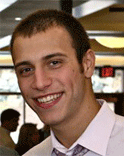
What inspired me to become a writing tutor:
I first became a writing tutor at Pascack Valley High School during my junior year there. Upon coming to Penn, I sought and found the next step in my development at the Center for Programs in Contemporary Writing. I enjoy talking with my peers and helping them organize their thoughts and ideas into a cohesive body of work.
How my experiences affected my Penn experience:
Working at the Marks Writing Center has really broadened my experience and training at Penn. As a Pre-Med, Biological Basis of Behavior major mainly devoted to studying science, I like using a different part of my brain when I come into the Center. Consistently talking, thinking, and writing about writing has allowed to me to view the process and its importance to all fields in a much deeper way.
The most rewarding experience I've had as a writing tutor:
I find great pleasure in helping a student recognize his own logical jumps or global errors in his writing. Sessions where I only sporadically speak are the best; I love giving a push, then sitting back and listening to a peer making strides on his own.
The most important thing students take away from a session with me:
I like to leave a student with a better understanding of unity and clarity. If a paper is all over the place, I try to guide the narrowing process. There should be a synergy of reasons supporting the proposition. Also, I try to help students do away with the artificial "writing voice," instead sounding authentic and clear.
About taking my own advice:
After completing a first draft, I'll often read the entire thing out loud, to myself! This helps me catch typos, develop a style, and find reasons that are not sufficiently supported by examples. I try to act as if I'm speaking in a debate.
Molly Sprayregen
English and Creative Writing, C'13

What inspired me to become a writing tutor:
Becoming a writing tutor allowed me to combine my greatest passions: writing, editing, and discussing a variety of interesting topics. As an aspiring travel writer and book editor, I love any opportunity to discuss writing and to help others understand it.
How my experiences affected my Penn experience:
Every time I work with a student in the Writing Center I learn something. Sometimes, I have realizations about my own writing, and sometimes the topic of a student's paper gives me ideas of my own. The exposure to so many different subjects--because people come from across all disciplines--is not only interesting, but helps round out my general knowledge.
The most rewarding experience I've had as a writing tutor:
Anytime someone says, "Thank you so much, this was really helpful." That statement is one of the most fulfilling things someone can say. Knowing that forty-five minutes discussing an assignment with me helped a student become a more confident writer is all it takes to make me know it was worth it.
The most important thing students take away from a session with me:
I try to make students understand that writing is more than content. How and when you say something is as important as what you say. Proper organization will make it so much easier for professors to understand the interesting argument that is usually there but often hidden.
About taking my own advice:
I never think of my papers as complete. They are always in need of improvement and always changing, which is why I like to write them as far in advance as possible. My own editing mostly focuses on organization. It doesn't take too long to figure out what I want to say, but I am constantly changing the order of my statements to make sure that they are clear and concise.
Joseph Yellin
Biological Basis of Behavior, C'11
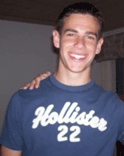
What inspired me to become a writing tutor:
Throughout high school, I was a very strong math and science student. I only started to enjoy English/writing courses in 10th grade after having an incredible teacher. By senior year, I had become a student mentor in my high school's writing center. I enjoyed my writing seminar at Penn (Shakespeare's Teenagers) and particularly loved the peer review aspect of the course. Classmates gave me positive feedback about my reviews and thanked me for helping them express their thoughts more clearly. I realized that I loved helping my friends out and especially enjoyed seeing them become better writers. By that point, I could definitely see myself enjoying the work of a writing tutor.
How my experiences affected my Penn experience:
It has affected me in three ways. First, I appreciate that I am in an extremely influential leadership role. I never dreamed that I would present to 70 faculty members of the Critical Writing Program about the best ways to talk about writing with freshmen, as I was asked to do at the end of my writing tutor training. Second, I've noticed that tutoring others has helped me improve my own writing. Additionally, with a BBB major it is quite easy to focus only on science courses; being a writing tutor has helped me maintain a well-rounded academic outlook.
The most rewarding experience I've had as a writing tutor:
The first student I ever tutored came to me with a 25-page paper. Since we are only allotted 45 minutes per session, the tutors are supposed to have the writers read through the first few pages and work on those, the logic being that if the first few arguments are clear, concise, and well-written, the rest of the paper is likely to be, as well. And if there are issues in the beginning of the paper, mistakes have a tendency to repeat themselves. Although I was prepared for the possibility of a long paper, I was extremely overwhelmed and quite nervous since this was my first official student to tutor. At the end of the 45 minutes, I asked him how he thought the session went. He told me that it was one of the most productive writing conferences he had ever had and asked me to write down my name. Of course I complied but asked him for what. He replied, "Are you kidding, I want to make sure I get you next time!" The next day, Dr. Ross sent me an email containing this student's positive feedback.
I think the most important thing students take away from a session with me is:
1. Know your audience!; and 2. Strive for a unified and coherent piece of writing.
About taking my own advice:
I always try to take my own advice. The hard part is distancing myself from my own writing so that I can objectively critique my work. Once that distance is created, I can reread my piece and ask myself all the questions I ask those who visit the Center. Answering such questions ultimately makes my own writing much stronger.
Daniel Lewis
Biology, C'13
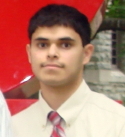
What inspired me to become a writing tutor:
I owe my writing skills to many teachers--those from elementary school, high school, and now college. But the greatest English teacher in my life was my mother, who always sacrificed her time to assist me one-on-one with my writing. And so I felt it was important to share my skills with others with the same dedication as a tutor.
How my experiences affected my Penn experience:
My experiences with helping others as a writing tutor were so rewarding that they encouraged me to immerse myself in similar roles--ones that would allow me to continue to make some difference in the lives of others. Tutoring at the Writing Center pushed me to serve my own neighborhood, the Penn community, and West Philadelphia.
The most rewarding experience I've had as a writing tutor:
Toward the end of the semester, I often tutor students who are working on final assignments with a deadline approaching. At the start of each tutoring session, I usually sense the student's anxiety, but as we go over the paper together page by page--reading it aloud, making comments, and probing for ideas--the student relaxes. As an incoming freshman, I never really believed I had the skills to tutor my peers, much less transform their nervousness into confidence. I feel that this aspect--working with students, seeing a positive outcome--is what drives my passion for tutoring.
The most important thing students take away from a session with me:
I remember reading about what Edgar Allan Poe termed "unity of effect" in The Philosophy of Composition. I emphasize this concept during my tutor sessions--the writer should decide what effect he or she wants to have on the reader and then use all his or her "creative powers" to achieve it. Accordingly, I try to teach students to examine each word, phrase, or sentence, identify its purpose, and ask themselves whether or not it supports the overall message.
About taking my own advice:
There is no such thing as a perfect piece of writing; okay, maybe Shakespeare wrote a few. I am no Shakespeare, so I must always refine my skills through relentless practice, advice from others, and of course, advice from myself.
Chris Caponetti
Economics W'09
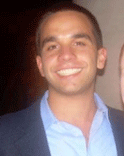
What inspired me to become a writing tutor:
I wanted to give back to Penn. Tutoring allowed me to add to our university in my own small way by helping my peers communicate more effectively through writing.
How my experiences affected my Penn experience:
Undeniably, tutoring broadened my liberal arts education. During my time as a tutor, I had the privilege of meeting wonderfully creative and insightful people from across the University. Through my peers' writing, I learned about French history, political science, and contemporary art without ever having stepped foot in those classrooms. As a student of finance and accounting, I loved every opportunity to peek inside a different intellectual world.
The most rewarding experience I've had as a writing tutor:
I believe people are inherently very protective of their writing. Thus, effective tutoring sessions demand a unique trust and respect between tutor and tutee. I will forever be grateful for the trust that my tutees gave me. And I hope that I lived up to that trust by helping them become better writers.
I think the most important thing students take away from a session with me is: It's not about what your sentences "say," it's about what they "do." If it doesn't further your thesis, you can't be afraid to hit Delete (no matter how great something sounds).
About taking my own advice:
"Clarity of message" is highly valued in my career in equity research. Every time I sit down to write a research report, I always ask myself two questions: "Am I making our point?" and "How can I make it even clearer?"
Other comments:
I am presently a junior research associate in New York covering the pharmaceuticals industry.
Ben Wang
Physics and Math, C'13
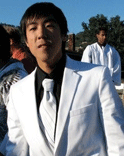
What inspired me to become a writing tutor:
Contrary to what most people would expect from a writing tutor, I used to be a horrible writer. Throughout middle and high school, I would not receive the greatest marks in my English classes and my parents tried everything in their power to turn me from just a "math guy" into a more well-rounded person who could calculate and write. Things changed when I took a writing seminar on medical ethics my freshman year at Penn. I learned how to construct arguments logically, how to write concisely and clearly, and how to make sure every paragraph says and does what I really want it to. And while I certainly still have a lot to learn about writing, I feel that my experience allows me to help save other people from the same frustrations I have had.
How my experiences affected my Penn experience:
Being a writing tutor has positively influenced my Penn experience. I love meeting new people at the writing center who are truly eager to learn and write better. At Penn, the students I work with are often full of great ideas. Helping them communicate those ideas more clearly in their writing is tremendously rewarding--and I also learn a lot about a range of topics. In a single day, I may take in brilliant arguments on the role of social media in voting propaganda or discover how people in poorer countries are left behind in the modern economy. Tutoring has helped make me a better writer and a more well-rounded person.
The most rewarding experience I've had as a writing tutor:
One of the most rewarding experiences I've had as a writing tutor came in a session with a senior applying for an academic scholarship. Even though his writing was already near flawless, working with him was so rewarding because of the all-encompassing experience it provided. Along with working together to unify his personal statement and make it even better, I also took a walk in his shoes, saw the vision he had for his life, and learned so much about writing and the Thai culture into which he planned to immerse himself.
The most important thing students take away from a session with me:
One thing that helped me improve as a writer is realizing how important it is to be concise. If there is a way of saying what you mean with fewer words, use it. I also emphasize putting the writer in the reader's shoes. Many students try to use big words, but it pays off much more to just get your idea across. Short, clear statements resonate with readers.
About taking my own advice:
I would be hypocritical if I did not. I do not like hypocrites.
Triston J. Francis
Wharton '12
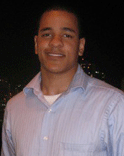
What inspired me to become a writing tutor:
As soon as I hit campus, I realized the importance of communication. Regardless of where life takes me after graduation, my ability to communicate will be crucial to success. A stronger understanding of what can be accomplished through words inspired me to become a writing tutor.
How my experiences affected my Penn experience:
Growing up, I had a mathematical mind and chose to do as little writing as possible. Consequently, I lacked a fundamental understanding of writing. During a freshmen seminar at Penn I realized that I needed to sharpen my skills if I were going to be a good student. After spending countless hours making personal appointments at the writing center, I became a much stronger writer. I entered Penn as a struggling writer and after dedicating two years to becoming a stronger writer, I am now able to serve as a writing tutor. This showed me what hard work can accomplish, which not only affected my Penn experience but my life as a whole.
The most rewarding experience I've had as a writing tutor:
Before my first tutoring appointment, I was unsure how helpful I would be. But the first student I worked with had some time to chat and she explained how helpful her appointment had been. She outlined the various ways our conversation was going to help her with future assignments. My first night tutoring was a great success, and a truly rewarding experience.
The most important thing students take away from a session with me:
The most important message I like to leave my peers with is that they can accomplish great things as writers. I want them to leave with not only an understanding of how to strengthen the paper they brought in, but also an idea of how they will go about becoming a stronger writer for all future assignments.
About taking my own advice:
Yes, I actively take my own advice and continue to work on my writing abilities whenever I can. Even though I am a writing tutor, I frequently go to the writing center ito get feedback from my peers.
Adam Amdur
Political Science, C'11
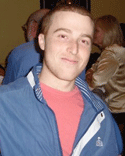
Why I chose to visit the Writing Center:
I am a transfer student, and I went to the Writing Center because my professor expressed her support for the program. She noted it served a positive purpose for students who wanted an extra set of eyes for their papers. I always look to improve my writing, and, as a result, the Writing Center seemed like a worthwhile option to consider.
What I found most rewarding about my sessions with tutors:
My writing tends to move from topic to topic without coherent transitions and organization. My tutors helped me maintain my ideas while building my paper to a more unified form. The sessions helped tremendously because they allowed me to focus on the overall issues of my paper, namely organization and thesis concerns. During one semester, my writing went from a C grade to an A grade.
How my experiences affected me:
Without a doubt, I felt more confident about my writing after I completed my sessions. I took important lessons away with me and built my paper off of ideas my tutor discussed during our session.
Honors and awards:
Dean's List
Other comments:
The Writing Center is extremely beneficial for the bewildered as well as confident writer. The one-to-one interaction allows the student and tutor to focus on the overall structural characteristics of the paper. I highly recommend the Writing Center for any stage of the writing process, rough draft to final revision. The tutor's thoughts and abilities are unmatched elsewhere in the University for students looking to improve their writing.
Neel Lalchandani
Political Science, C'10

What inspired me to become a writing tutor:
I was offered the opportunity to become a writing tutor after my first semester writing seminar. I was inspired to take the position because I believed that it would be a challenging and rewarding outside activity that would nicely complement my schoolwork at Penn.
How my experiences affected my Penn experience:
Working as a writing tutor has positively impacted my college experience. First, it has allowed me to meet and connect with students from a diversity of backgrounds and disciplines who share a common commitment to improving their writing. In addition to helping others thinking through the writing process, I also believe that my writing has improved as a result of my efforts. Further, my work has allowed me to become part of the larger Kelly Writers House and Critical Writing Program communities at Penn.
The most rewarding experience I've had as a writing tutor:
I have greatly enjoyed the opportunity to work with my peers in the standing appointment format, which allows me to meet with the same student on a weekly basis. During my junior year, I had the opportunity to work with a senior who was struggling with writing assignments but had a strong desire to improve. It was incredibly rewarding to build a relationship with him as well as to see his confidence grow and writing improve as the semester progressed.
The most important thing students take away from a session with me:
There are two main points that I try to emphasize. First, I hope that students come away from sessions with an understanding that writing is a conscious exercise that requires hard work and a certain process. Second, I try to show my students that the organization, structure and content are intimately linked to one another.
About taking my own advice:
I sure try to. I am a very deliberate writer myself and frequently seek out the advice of my fellow peer writing tutors.
Amy Lopez
Undeclared, C'13
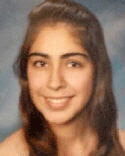
Intended field of study:
I will most likely pursue a major in political science or history.
Why I chose to visit the Writing Center:
After taking the required writing course the fall semester of my freshman year, I realized that there was still much room for improvement in my writing. I want to work towards becoming a better writer and see the Writing Center as the best tool to help me do so.
What I find most rewarding about my sessions with tutors:
I like that I can come in with questions on grammar and style and always leave with answers. Although we don't always finishing going over everything I'd planned, I see this as a sign of my improvement and newly acquired attention to detail.
How my experiences affected me:
Going to the Writing Center has taught me the importance of prioritizing and time management. I'm also improving my writing while gaining more confidence in my abilities.
What I would tell other students about the Writing Center:
The Writing Center has been immensely helpful to me. While the place is usually packed and crowded around midterm season, I wish more students took daily advantage of its resources. By attending the Center, I have been exposed to talented minds whose genuine interest in language is quite contagious. The Center is friendly and homey. I've often spent a couple of hours studying there because I enjoy its calm atmosphere. What's more, I've had the opportunity to work with Assistant Director Susanna Fry. Fry is delightful and extremely motivating. I am thankful to have such a wonderful resource like the Writing Center at Penn.
Shana Mansbach
Philosophy, Politics, Economics, C'14
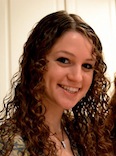
About Me:
I am from Baltimore, Maryland studying Philosophy, Politics, and Economics. I’ve always been a passionate writer. An avid reader of The Economist, I’m fascinated by the intersection of global affairs and writing. I’m currently writing for several publications that focus on international business and politics, and I hope to further explore the world of journalism in the future. When I’m not at the Writing Center, you can find me running, reading, or exploring the many neighborhoods of Philadelphia.
The most important thing students take away from a session with me:
Clarity is key. Writing is all about communication. One's message can quickly get lost in a cacophony of excessive detail. When in doubt, abide by the advice of Strunk and White: “When you say something, make sure you have said it.”
Lisa Xu
Finance and Management, W'14
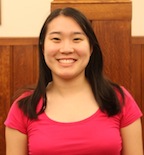
About Me:
I am a junior in Wharton from West Chester, Pennsylvania, and I love being a Writing Tutor! Outside of the Writing Center, I am the President of Wharton Business Law Association, Wharton Representative in the Undergraduate Assembly, and Vice President of External Affairs for the Class of 2014 Board. I also had the honor of being published in the Spring 2012 volume of 3808: Journal of Critical Writing for my writing seminar essay "Darwin to Dior: An Evolutionary Analysis of Consumer Behavior." In my free time, if I'm not sleeping, I enjoy playing the piano, snowboarding, meeting new people, practicing my French, and telling people how to pronounce my name (“lease a shoe”)..
The most important thing students take away from a session with me:
They learn that to be a good writer requires only to be a good thinker. I find that most who visit the Center have solid ideas. All the thoughts that they need are in their heads, but often lose impact once written on the page. One of the strategies that I find consistently effective is to focus the discussion on the content. I ask the writer to explain to me what he or she is trying to say on paper, and we then engage in an intelligent conversation about the topic. I may challenge the argument or ask or an explanation of a concept. Almost without fail, what students express verbally is clear, organized, and thoughtful. I then ask them to write down what they said, and they are amazed that they have solved their own problem. Of course, this technique is only one among many that I use as a tutor, but I have found that it gives students confidence to discover that they already have the tools needed to become a great writer.
Meg Schneider
Environmental Studies, C'13
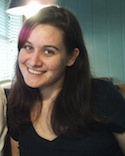
About Me:
I am currently a student reporter for the Initiative for Global Environment Leadership, and was recently awarded the Green Fund for my senior thesis.
What inspired me to become a writing tutor:
I grew up in a household where my family always read, and then had a great high school English teacher. Nonetheless, I found the writing seminar extremely helpful in making the transition to writing at the college level. As for becoming a writing tutor, I realized one of my favorite parts of the writing seminar was the peer review for each assignment. I really enjoyed helping others improve their writing, so I jumped at the chance to become a tutor on campus.
What I've Learned as a Tutor:
I've learned how important it is to tailor my tutoring style to the individual student. What works with a shy student may be the exact opposite of what works with a more gregarious person. Learning this about human nature has helped me become a much better friend to others. Additionally, the Writing Center has helped me learn about topics I would never have had the chance to study, from the sociology of online dating to upper level negotiation classes.
The most rewarding experience I've had as a writing tutor:
Last year, I had a student who had a very formulaic style. When we discussed different strategies to change his style (e.g., varying sentence structure, introducing quotes), it was like a light bulb turned on. He immediately started to revise his entire paper in front of me, changing sentence after sentence. At the end of the session, he said that no one had ever told him how to improve his writing, and he was really glad for my help. It's extremely rewarding to help someone improve his or her writing, as opposed to just improving an assignment.
The most important thing students take away from a session with me:
I try to emphasize clarity in writing as much as possible. Trying to make your writing sound "smart" will likely only make your paper worse. I also remind students that they will not get the chance to explain their sentences to most readers; they must make sure their writing and reasoning is as self-evident as possible.
About taking my own advice:
I definitely have learned to view my writing more objectively! I remember how, a few short years ago, I would take it very personally if anyone criticized my writing. Now I am much more receptive to others' comments.
Brian Hsia
Molecular Biology, Chemistry, C'14
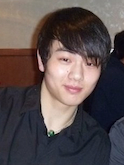
What inspired me to become a writing tutor:
I was never a good writer in elementary or middle school. I continued to struggle with writing until junior year of high school when I decided to challenge myself by taking an AP Language course. Since then, I've worked tirelessly to improve my skills as a writer, learning how to write critically and how to develop my voice in papers. Like any student, I have learned that writing is a difficult process and requires much practice. As a tutor, I can sympathize with other students who come to the Center with problems developing a proposition or organizing their essays. I know how frustrating this can be, so I try my best to try to alleviate the stress associated with writing. Speaking not only as a Writing Tutor, but also as a premed student majoring in biology, I know that writing is a valuable tool. The ability to write well is crucial in any discipline or profession, so it's important to stick with it and develop it as much as possible.
Molly Dee

About Me:
I am currently a senior in Mechanical Engineering and Applied Mechanics, as well as a newly matriculated graduate student in Integrated Product Design. I enjoy all sorts of activities outside of engineering including rock climbing, hiking, photography, writing, and just hanging out.
Why I love being a writing tutor:
I think being a well-rounded person is extremely important. Engineering is pretty demanding these days and, as you might imagine, it can be a challenge to maintain a diverse set of skills when you are constantly living in the Towne building. When I was offered the opportunity to become a writing tutor for the Critical Writing Program, I jumped at the chance to set official time aside each week to step away from math and science, and focus on writing. I have always enjoyed writing. It brings me great pleasure to listen to and read the ideas of others each week. In addition, becoming a writing tutor has been an excellent chance for me to continue to hone my own writing and reasoning skills as I discuss writing strategies with my tutees. All in all, being a tutor has been a wonderful experience.
